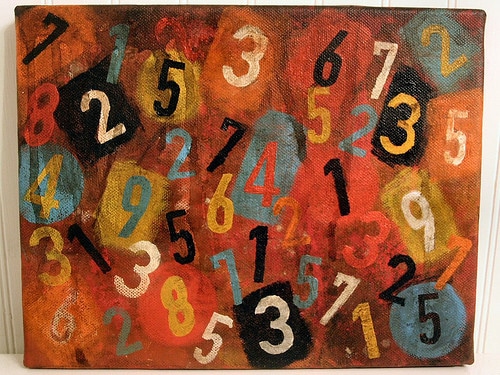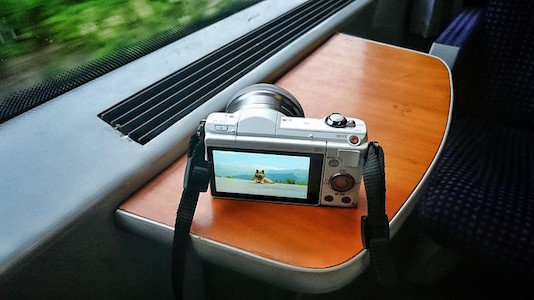“In building a statue, a sculptor doesn’t keep adding clay to his subject. Actually, he keeps chiseling away at the inessentials…It is not daily increase but daily decrease; hack away the unessential.”
-Bruce Lee

A number of you are planning to travel the world one day, which won’t happen unless you can overcome these 7 obstacles. Here’s Part 1 of the series.
One of the biggest obstacles and first things people say to hold themselves back from traveling the world is “it’s too expensive” or “I can’t afford that”. As I mentioned last week in overcoming your comfort at work, it is hard for us to break our routines and money is no different. Money is probably the most common way you’ll talk yourself out of traveling the world when in reality it’s not much different than any of the other obstacles.
You Don’t Realize How Little You Need
 The less mobile you are the more stuff you have. If you’ve got a large apartment or own a home all you need to do is look around to see how much stuff you’ve accumulated. It would probably take you hours to count it all. How long would it take you to count the things you really need?
The less mobile you are the more stuff you have. If you’ve got a large apartment or own a home all you need to do is look around to see how much stuff you’ve accumulated. It would probably take you hours to count it all. How long would it take you to count the things you really need?
- We get used to having certain things, forget how much those things are costing us, and confuse them with what we need. The result is thinking that you can’t afford chai lattes, premium cable, or eating out every night. When the reality is you don’t really need them (and probably won’t miss them too much when you’re traveling.)
The more you travel the more you’ll realize what you really can’t do without. But the first step to traveling the world is to go through the process at home. Start one room at a time and think about it. You can even sell some of your old books and CDs to raise funds for your travels.
Less Not More
 Don’t make the mistake of thinking you need to make more money to travel the world when what you need to do is spend less. I know, you already think you’re frugal enough but I’m willing to bet that I could chop through your budget like a machete in the rain forest.
Don’t make the mistake of thinking you need to make more money to travel the world when what you need to do is spend less. I know, you already think you’re frugal enough but I’m willing to bet that I could chop through your budget like a machete in the rain forest.
Some Ways To Spend Less
- Live Spartan, picking and choosing how to spend your money on what you enjoy.
- Start using your computer more. You can watch TV (Alluc), call people (Skype), and work from anywhere (an amateur’s guide to location independence part1, part 2, and part 3) all on your computer – so why pay extra to do it?
- Take what you save and put it aside for your next trip using a simple travel budget.
- Save 50% on your power bills for 6 months to pay for your next trip.
- Start making stuff instead of buying it, cook, and avoid credit.
Make A Budget, Make A Budget, and Track Your Spending
It’s virtually impossible to accurately calculate how much you’ll need to travel the world, survive, and do some fun things if you don’t calculate the amount of money that you need. (I mean need in the literal sense. You don’t need an iPod.)
Most people say it’s expensive to travel the world, that they can’t afford it, or it’s impossible simply because they don’t know how much it really costs. Where will you be going makes a big difference too, for example an individual can live on $500-600 a month in Thailand.
Quantify
 Money is an obstacle primarily because we don’t quantify it and it’s easier to use it as an excuse rather than crunch the numbers. Once you do you’ll end up with a number that is much lower than you ever dreamed. I’ve seen people do this and watch their faces light up with an “oooooh”.
Money is an obstacle primarily because we don’t quantify it and it’s easier to use it as an excuse rather than crunch the numbers. Once you do you’ll end up with a number that is much lower than you ever dreamed. I’ve seen people do this and watch their faces light up with an “oooooh”.
Crunch The Numbers
You’ll hear endless stories about how cheap it is to live in India or Tanzania but you need to personalize what you are hearing.
- Start by finding out how much you spend in a month, without cutting back. Now get rid of any major debts on things you can sell (like a house or car). A large part of money you need has been cut away.
- Begin by working your way up, not down. Food, water, shelter – not new shoes, coffee maker, bicycle.
Flip The Equation
Money buys you things so we try to make more money for things we think we need. The opposite works too though and the less things you have, the less money you need – which is an easier way to make things work for you.
Set aside some time to calculate what you want to do, where you want to go, and what you don’t need. It’s easier to tackle a problem on paper than in your head.
Now that you’ve got some realistic financial goals, know how much you need to get by, and have started ditching some junk to fund your next trip, you’ve got a solid foundation on which to begin building your grand plan. I’ll cover that topic in Part 3, next week.
[photos by: diankarl, winterofdiscontent, Yersinia, mollycakes]




![How Much To Tip For Everything Around The World [MAP] How Much To Tip For Everything Around The World [MAP]](https://photos.smugmug.com/Other/Thumbnails/n-G3vWG/i-fZJM87T/0/bcd848f7/O/i-fZJM87T.jpg)







You are very correct in saying that the “the less mobile you are the more stuff you have.”
Acquiring “stuff” costs far more than traveling ever will, but many people still find that hard to believe.
There are two more related points to make here. First, by moving abroad or traveling you will no longer have the peer and societal pressure to consume a never ending supply of “stuff.” It is normal to have few material positions when you move abroad and there is no pressure to buy things because all of your peers are in the same situation.
Secondly, there is a mental cost of buying and maintaining possessions. How much time do you spend shopping, cleaning and caring for your goods. How many hours did you spend comparison shopping for your last TV? How much time do you spend on cleaning and maintaining your house and your cars? All that time could be directed towards valuable experiences or growing a business.
Traveling is most certainly cheaper than staying at home.
John, great points. There’s a notion that traveling is something that is very expensive. While that can be true in some cases, it’s really daily life and having a bunch of “stuff” that’s expensive *and* keeps you from traveling.
Like you say, all of this buying and maintaining comes at a high mental cost without much reward. Money shouldn’t be an obstacle to traveling, it’s really a matter of the choices we make and where the money goes.
Not to mention, while traveling…there are so many free things to do.
Beaches, sightseeing, parks. There is so much you can do for free or next to nothing.
Also as a female single traveler, I find that I usually only buy the first drink in a bar, and the rest are usually paid for by local folks that want to hear about back home.
It pays to make friends with the locals, often they’ll put you up for a few days. If you’re a little more timid, couchsurfing.org is a great way to find a free place to stay!
Maybe people get stuck thinking about the cost of actually ‘traveling’. Like plane tickets, hotels, etc. but you’re right. When you’re at your destination money isn’t being funneled out of your pockets. Much of the time passes by without spending and there’s tons to do for free.
Btw, a good perk of traveling as a single female!
I know exactly what you mean about chopping down a budget. The number 1 way that we save money: we don’t buy stuff. This is really the big one. A couple of weeks ago, a friend was lamenting how little money he had and how much caring for a child costs. I kept my mouth shut but I wanted to remind him that he and his wife had just recently purchased 2 cars with luxury components like leather seats!
When people wonder how we are able to afford travel, we respond that travel is our priority. Any time we are in a store and consider purchasing an item — say a piece of furniture or clothing or whatever — we remind ourselves that we could use that money on our travels for an amazing experience and then that item we purchased would just be sitting in storage.
I hear that from people all the time and think the same thing. It’s about priority and planning like you say and not buying stuff!
What a refreshing perspective. Money is always the number one obstacle in people’s minds for most things but it doesn’t have to be. As a freelance travel writer, my lifestyle has involved a limited amount of “necessary stuff” for years. I don’t use a cell phone, car or drink coffee. To some people those are basics but I live in a major city where driving isn’t required, access to payphones still exist and coffee chains are way over priced. I save enough just by cutting out those things to travel a lot of places.
Thank you Fly Girl. Lots of people confuse/misuse the word ‘need’. It’s not used to mean what you need to survive, but what you want.
Differentiating and cutting out the wants from the needs really leaves you with a lot more money to do cool things, like travel!
Very informative post and you really hit the nail on the problem here. I think people is just get too tie down to their stuffs. It’s all about prioritize what you think it’s important to you.
The less stuff you have the more money you save and the lighter you are the easier it is to travel 🙂
Excellent Anil,
I have been asked so many times how I am so rich to travel and I respond that I spend less traveling than I did when in the United States. It has to do with setting priorities. The ones who ask me how I am rich to travel have new cars, flatscreen tv’s, ipods, and homes.
I climb volcanoes, eat street food, own 3 outfits and a netbook and couchsurf.
Great guide!
Thanks Mark. I laughed at your comment “The ones who ask me how I am rich to travel have new cars, flatscreen tv’s, ipods, and homes.” Fancy stuff doesn’t make you rich, it just makes you poor.
Hi,
There are so many different ways you can fund your travels once you’re on the road. And even Europe can be a very cost-effective place once you’re here. Jobs may be a little more difficult to come by, but they’re there if you do a little planning ahead of time. It’s easy to start in the states because you can work your way around the country.
I think the most important element is to decide that it’s what you really want to do, set a time line and decide how, when and where you’re going to get started – and then just do it.
Think about your skills, your passions and your strengths, because there are so many ways you can fund your travels doing what you love.
I’m looking forward to reading more of your blog.
Hi Cheryl, thank you for the comments. I agree that ourselves are our greatest asset and that we each have skills and expertise that we can market and use to earn money no matter where we go.
The time line is important too. Once you’ve got the plan it’s only a matter of executing it.
Great post, Anil!
I am just beginning my Nomadic adventures. I am taking my first of Many week long excursions next week. Currently my plan is to work three weeks and travel one, and while travelling evaluate the possibilities of working while on the road, so I can do more travelling while earning income. I am also leveraging my time to create residual income streams.
Looking forward to your next installment.
Rasheed
Hi Rasheed, I’m glad that you liked this post, Part 3 next Thursday.
Hi Rasheed, just checked out your blog it’s pretty interesting. Do you have a post that outlines your plans?
You seem to be going about becoming location independent in a different way than the usual (if there is such a thing). Let me know, would be interested to learn more.